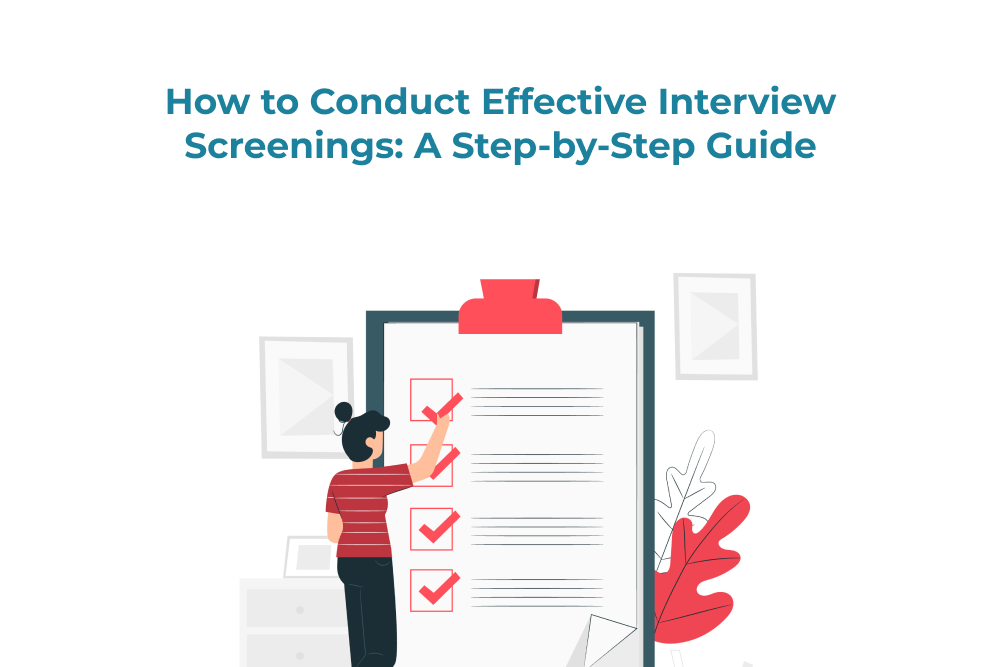Interview screenings are an essential part of the hiring process. They provide an opportunity for employers to assess candidates before deciding who to invite for further interviews. Conducting effective interview screenings can save time and resources. In this step-by-step guide, we will explore what exactly a screening interview is and how to prepare for one.
What is a screening interview?
An early round of interviews called a screening interview is used to whittle down potential applicants and choose the most qualified ones for future consideration. It normally only lasts for 15 to 30 minutes over the phone or video. A screening interview is conducted to ascertain a candidate’s interest in the position and the firm as well as to examine the candidate’s fundamental qualifications and suitability for the position.
The interviewer will pose a series of inquiries to the candidate throughout the screening interview in an effort to better grasp their qualifications, background, and motivations. This preliminary interview helps to reduce the number of applicants and choose which ones will be contacted for in-person or second-round interviews.

During a screening interview, the fundamental qualifications of a candidate are assessed, which is one of the interview’s crucial components. Academic background, prior employment history, and any relevant certifications or licenses are some of the areas the interviewer may inquire about.
The information garnered helps to determine whether the candidate meets the fundamental requirements of the post. Additionally, the interview gives the interviewer an opportunity to evaluate the candidate’s compatibility with the job and organization. This can be done by asking questions about the applicant’s professional goals, teamwork skills, and ideal workplace, among other things. The interviewer can assess whether a candidate aligns with the values and expectations of the company by evaluating these attributes.
The screening procedure starts so that the interviewer can evaluate the candidate’s zeal and love for the job and the company. The interviewer may ask the candidate about their prior interactions with the business, their reasons for applying for the job, and the extent to which their qualifications and experience match those required for the position. This enables the interviewer to gauge the candidate’s level of dedication and passion, which is crucial in figuring out whether the candidate is a good fit for the position. It is important to stress that the screening interview benefits the firm as well as the candidate because it allows the latter the chance to educate the candidate about the latter, the position, and the recruiting process. Candidates can also use the screening interview to inquire about the firm’s culture and values, the dynamics of the team, and prospective career advancement prospects within the company. The candidate can make an informed decision about whether to apply for the position and proceed in the hiring process by acquiring this information. In conclusion, the screening interview is an important phase in the hiring process because it helps employers to screen candidates, determine whether they are qualified for the position, and select the best prospects for further consideration. The candidate’s qualifications should be assessed, together with their interest level and fit with the position and corporate culture.
What kinds of inquiries might I anticipate during a screening interview?
Screening interviews typically include questions that help employers assess a candidate’s qualifications and suitability for the role. Some common inquiries during a screening interview may include:
- Tell me about yourself: This question allows the interviewer to get a brief overview of your background, experience, and interests. Highlight your most relevant qualifications and accomplishments.
It’s crucial to find a balance between being succinct and including enough information to highlight your qualifications and expertise while responding to this question. Briefly describe your educational history and any relevant professional experience you have to begin. After that, concentrate on presenting your most important achievements and abilities that make you a strong contender for the job. Remember to emphasize how your experience makes you the ideal candidate for the position and personalize your response to the job requirements.
2. Why are you interested in this role/company? Employers want to know if you have done your research and are genuinely interested in the position and company culture.
When answering this question, it’s important to demonstrate your knowledge about the company and the specific role you are applying for. Start by researching the company’s mission, values, and recent accomplishments. Highlight specific aspects of the company that resonate with you and explain how your skills and experiences align with their needs. This will show the interviewer that you are genuinely interested in the role and have taken the time to understand the company’s goals and culture.
3. What are your key strengths and weaknesses? This question allows employers to gauge your self-awareness and assess how well your skills align with the job requirements.
When discussing your strengths, focus on the ones that are most relevant to the job you are applying for. Highlight specific skills and qualities that make you an asset to the team. Provide examples of how you have used these strengths in previous roles to achieve positive outcomes. This will demonstrate your ability to contribute effectively in the new role.
When discussing your weaknesses, it’s important to be honest but also show that you are actively working on improving them. Choose a weakness that is not critical to the job you are applying for and explain the steps you are taking to overcome it. This will show the interviewer that you are self-aware and committed to personal and professional growth.
Describe a difficult scenario you had to deal with at work and how you handled it. Your capacity for problem-solving and your approach to challenging circumstances are assessed by this question.
Select a difficult issue that illustrates your capacity for critical thought, solid judgment, and effective problem-solving while answering this question. Start by setting the scene and describing the particular difficulties you encountered. Then, go into detail about the actions you did to resolve the matter and what happened as a result. Highlight any successful outcomes or wisdom gained from the event. This will demonstrate your capacity for handling difficulties at work and your problem-solving abilities.
These are just a few examples of the types of questions you might encounter during a screening interview. It’s important to anticipate a variety of inquiries and prepare concise and compelling answers that showcase your qualifications and fit for the role.
How to get ready for a screening interview
Preparing for a screening interview is crucial to ensure you make a positive impression and advance to the next stage of the hiring process. Here are some steps you can take to get ready:
First and foremost, it is essential to research the company thoroughly. Familiarize yourself with the company’s mission, values, products/services, and recent news. This will not only help you tailor your answers to align with the organization’s goals but also demonstrate your genuine interest in the company. By showing that you have taken the time to understand the company’s background, you will impress the interviewer and increase your chances of moving forward in the hiring process.

Next, review the job description in detail. Understand the key responsibilities and qualifications required for the role. Take note of the specific skills and experiences the company is looking for. Once you have identified these requirements, it is crucial to reflect on your own experiences and find relevant examples that demonstrate your capabilities. By doing so, you will be able to articulate your qualifications effectively during the screening interview.
Preparing answers to common questions is another essential step in getting ready for a screening interview. Practice articulating your skills, experience, and motivations clearly and concisely. Utilize the STAR method (Situation, Task, Action, Result) to structure your responses to behavioral interview questions. This framework allows you to provide specific examples that showcase your problem-solving abilities and highlight your past achievements. By practicing your answers, you will feel more confident and prepared during the actual interview.
In addition to preparing answers, it is equally important to prepare your own questions for the interviewer. Think of insightful and thoughtful questions that demonstrate your genuine interest in the role and the company. This is not only an opportunity for you to gather more information but also a chance to showcase your enthusiasm and engagement. Asking relevant questions shows that you have done your homework and are genuinely interested in the position.
If the screening interview will be conducted over the phone or via video call, it is crucial to check your technology beforehand. Ensure that your internet connection is stable, and your audio and video capabilities are working properly. By doing a quick technology check, you can avoid any potential technical difficulties during the interview, allowing you to focus on presenting yourself in the best possible light.
Remember, a screening interview is your chance to make a strong first impression. Take the time to prepare and showcase your qualifications and enthusiasm for the role. By following these steps and being well-prepared, you will increase your chances of successfully progressing to the next stage of the interview process.










